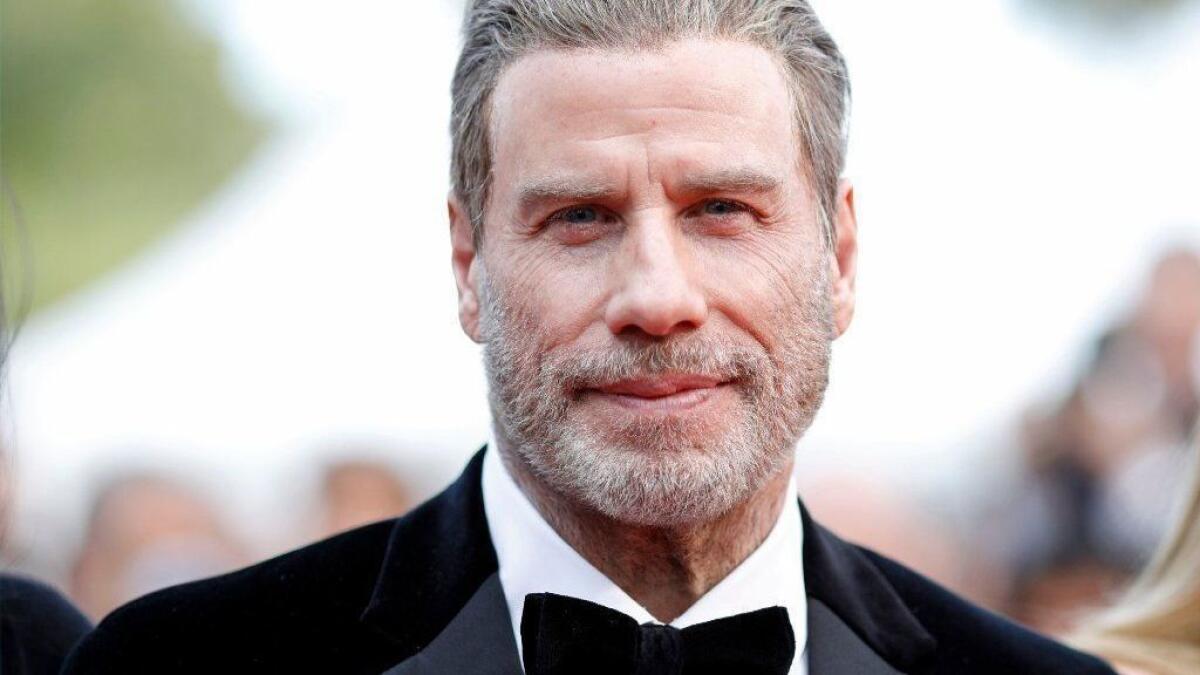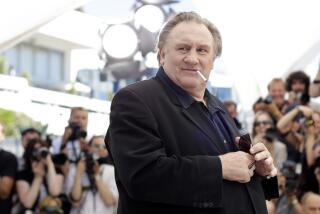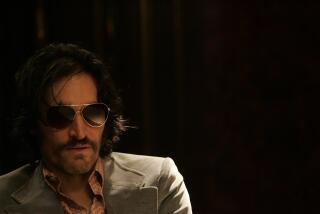John Travolta on #MeToo: ‘I honestly don’t know a ton about it’

John Travolta doesn’t do a lot of interviews. But at the Cannes Film Festival for the premiere of his mob drama “Gotti,” in which he plays embattled mafia don John Gotti, the Oscar-nominated actor sat for a two-hour conversation as part of the festival’s master class series, dubbed “Rendez-vous with.”
The event was moderated by a French journalist who largely asked fawning questions about Travolta’s résumé, asking the actor to go into detail about what it was like to become famous after “Saturday Night Fever” and whether or not he knew “Pulp Fiction” was going to be a hit.
The moderator did, however, ask Travolta about his feelings on the #MeToo movement and “what’s happening in Hollywood right now” — a conversation, of course, that has been a big topic at Cannes, where 82 women marched on the festival’s red carpet to highlight the lack of female filmmaker representation over the years and festival director Thierry Frémaux signed a charter pledging the festival would, among other things, take steps toward gender parity on its executive board.
“I honestly don’t know a ton about it, because I try my best to keep people equal — men, women, races,” Travolta responded. “My father was brilliant at it. He had a global viewpoint. I’m a citizen of the globe, and I’m a citizen of groups and people.”
He segued into the topic of protest, saying he typically viewed it as a “last resort,” and questioned its usefulness.
“Protest is valid. But how do you measure — how do you differentiate the moment where it becomes invalid?” Travolta asked. “It’s an art, almost, to say, ‘OK, let’s protest, but we’ve achieved that here and these particular rights. Now, let’s get smart about how we use that … protest so it doesn’t get into an irrational perspective.’ If we go back to the humanities of being each other’s friends and wanting and caring at a deep level, then we’ll make it. But it’s a dwindling spiral out there.”
There was no follow-up. Instead, numerous fans from different countries professed their love for the actor, asked whether or not he would star in their films and requested advice on how to become famous.
Travolta was generous in his responses, giving the appearance that he was truly invested in helping the aspiring filmmakers. One person in the crowd asked him to reflect on how he handled his failures, citing the critically maligned 2000 film “Battlefield Earth,” a sci-fi film based on Scientology founder L. Ron Hubbard’s 1982 novel.
“Picasso had sketches he didn’t sell and weren’t as popular as other things,” he said. “Every artist has an audience for different things they do, so there’s no fixed idea of what success is. … ‘Battlefield Earth’ was a beautiful idea to try to execute. Did we have the technical needs to make it ‘Star Wars’ or the money to make it ‘Star Wars?’ No, but I was very proud to get it done. That was a personal accomplishment for me. I could literally do anything I wanted, and I got it done. I have no regrets. I put it in my reel.”
During lulls in his career, Travolta said, he “decided to live life to the fullest” and absorb the humanity around him so that he’d have a “library of tools” when he did return to acting again. He poked fun of how many times it’s been written that he’s had a “comeback” — even as recently as 2016, when he played lawyer Robert Shapiro in “The People vs. OJ: American Crime Story.”
“You can mark it however you want to, but it’s all personal and subjective,” he said. “I just don’t feel like I’ve ever gone anywhere.”
Though Travolta spoke fondly of being able to tell a story in ten hours on the FX miniseries, he also acknowledged that the rise of television “is not so good for us who have established ourselves in human drama on the big screen. Because they’re not as sought after, those dramas.”
His new film, which received some particularly brutal reviews after its Cannes debut — a festival-sanctioned event but not part of the official lineup — is the “throwback kind of movie that I became famous on,” he said. It was directed by Kevin Connolly, best known for his role as manager E on HBO’s “Entourage.” One crowd member pointed out that Travolta has only worked with a few female directors, and asked if he noticed a difference on those sets.
“I can just tell you how I manipulated different things, like with Mike Nichols and his ex-wife Elaine May,” Travolta said, recalling 1998’s “Primary Colors. “If Mike got upset with me, I always went to Elaine because that was like going to mom. ‘Mike won’t let me say this line. Can you go talk to him?’ ‘Mike, go to John!’ [she’d say]. I can’t say I didn’t take advantage of a maternal rapport that a man and woman have, which may or may not be politically correct. But I’m just telling you my truth of it.”
Travolta added that he thinks a female director has a more “celebratory thing” — championing acting choices, for example, than a male director might.
“I don’t really make a lot of difference between the sexes,” he said. “I don’t really even like it, to be honest. I don’t like trying to make the sexes so different from each other. I find it kind of inhuman sometimes because we’re all in the same boat together.”
Follow me on Twitter @AmyKinLA
More to Read
Only good movies
Get the Indie Focus newsletter, Mark Olsen's weekly guide to the world of cinema.
You may occasionally receive promotional content from the Los Angeles Times.







